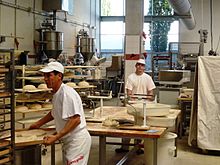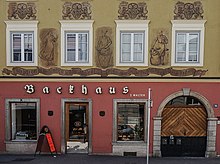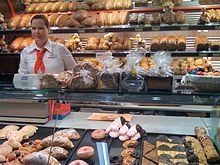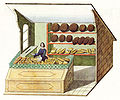bakery
A bakery is a craft business that produces baked goods such as bread , rolls , pretzels , coffee pastries or cakes .
The sales rooms that are usually directly adjacent to the production rooms are called baker's shops and are often marked with a pretzel on the nose label. The production area is called the bakery .
bakery


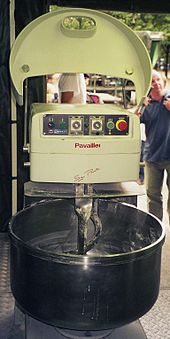
The bakery is the production room for the baked goods to be produced. The word bakery does not limit the size of the production room. There are bakeries in very different sizes, from the classic small craft business to largely mechanized large bakeries. In the case of fully mechanized bakery factories, on the other hand, one speaks of baking lines.
About the terminology
In order to be able to call himself a bakery , a responsible, trained master baker must be in charge of production. In addition, an entry in the craft register is mandatory. The associated profession is that of the baker . As a rule, trained bakery salespeople work in sales . Such prerequisites are not necessary in the bakery, since the baking of pre-made dough pieces (which are usually delivered in frozen form from a manufacturing bakery) does not require any special training. Trainees can also be employed here.
If a building consists largely only of the brick oven , it is called a bakery .
Classification according to size
Depending on their size, bakeries are part of the food trade or the food industry . They can be divided into:
- Small bakeries: they produce small quantities of baked goods that they sell in the attached sales room (shop).
- Medium-sized bakeries: Parts of the production are automated. These bakeries usually supply a large number of sales outlets affiliated with the company in a limited area (urban area, district).
- Large bakeries: production is largely automated. The products are sold, for example, by supermarkets or discounters .
- Backfabrik: The production is fully automated. The products are only brought to consumers in prepackaged form via retail chains.
- Self-service bakery: (e.g. the BackWerk franchise chain ), which are not legally bakeries, as they are not registered in the trade register and generally do not employ a master baker.
Origin of the bakery trade
In the regions that are part of Germany today, the baker's profession has been known at least since the time of Charlemagne (768–814). At that time, it was mostly serfs who worked on Fronöfen or monastery servants on monastery ovens. Due to the growth of the cities, the baker's profession developed as a "free" profession in the 10th century. The job title “Beck” (short for becker) or “Pfister” (from the Latin “pistor”) was used. At first, very few bakers had their own oven. They therefore bake their goods in the city's own bakeries .
One of the first large bakeries around 1858 in Cainsdorf
Bakeries are dying out
Due to the increasing massive competition from mass production in industrial bakeries and frozen goods for baking in the self-service bakeries, the classic retail baker is threatened with extinction in Germany, but also in other industrialized countries. Ten years ago, the daily bread roll sales for many home bakers were 3000 pieces, today this is sometimes only 1000 pieces. Many chains produce on the assembly line and then deliver, self-service bakeries are mostly supplied with frozen goods from abroad, where wage costs are lower (even with transport costs).
In Austria, there is a process of concentration on larger bakeries, on the other hand, smaller bakeries are asserting themselves through regional delivery services or specialization in special quality goods.
statistics
In Germany in 2019 there were 10,491 artisanal businesses and an extrapolated 35,000 branches, a total of 45,491 bakery shops. They employed 266,800 people, 14,773 of whom were trainees. The total turnover was 15.22 billion euros excluding VAT. Each company has an average of 25.4 employees. The average annual turnover per company was 1.451 million euros. (As of December 31, 2019)
The distribution of sales according to company size has its focus on large companies:
- The small group of bakeries (5.3%) with an annual turnover of more than five million euros generated a turnover share of 68.6%.
- Businesses with an annual turnover of 500,000 to five million euros (33.1% of all businesses) had a turnover share of 24.3%.
- The bakeries with an annual turnover of less than 500,000 euros (approx. 61.6% of all businesses) generated approx. 7.1% of the total turnover.
See also
literature
- Hermann Eiselen: The modern age of the bakery. A journey through its history from 1860 to 2005 . BackMedia Verlagsgesellschaft, Bochum 2006, ISBN 3-9808146-2-9 .
- Judith Beile, Ina Drescher-Bonny, Klaus Maack: Future of the baking trade. Hans Böckler Foundation, Düsseldorf 2009, ISBN 978-3-86593-121-4 | Online (PDF; 1 MB), accessed January 4, 2014.
Web links
- Anne-Marie Dubler: Bakery. In: Historical Lexicon of Switzerland .
- Exhibits from the Saarland Bakery Museum on the DigiCult website - Museums in Saarland
- Our daily bread roll , Die Zeit No. 19, May 1st, 2008
Individual evidence
- ↑ Are craft bakeries threatened with extinction? In: Baden TV GmbH. April 5, 2017. Retrieved July 18, 2019 .
- ↑ http://ooe.orf.at/news/stories/2621145/ More and more bakeries, ooe.ORF.at of December 24, 2013.
- ↑ The German bakery trade in figures from 2012–2019 , on baeckerhandwerk.de, accessed on May 23, 2020.
- ↑ The distribution of sales by company size in 2018 , on baeckerhandwerk.de, accessed on May 23, 2020.
